Dolphin Anty Anti-Detect Browser: Technical Review and Applications

In recent years, demand has surged for anti-detect browsers-specialized programs that spoof a user’s digital fingerprints. With their help, it is possible to work with multiple accounts through a single browser without drawing the attention of websites’ anti-fraud systems. Put simply, an anti-detect browser creates several isolated “virtual browsers” on one device, each with its own unique data set. One of the most popular representatives of this class is Dolphin Anty.
Dolphin Anty was created in 2021 by Denis Zhitnyakov, well known in traffic arbitrage circles. Initially, the product was designed for advertising arbitrage tasks (Google, Facebook, TikTok, etc.), but over time its functionality expanded to cover virtually any area of online activity. The browser quickly gained popularity: by 2023, Dolphin Anty’s user base had exceeded 800,000. It was even recognized as the #1 anti-detect browser by the industry award Affiliate Space Awards. Under the hood, Dolphin Anty runs on Chromium but with its own kernel modifications. This approach sets it apart from many competitors, enabling highly realistic substitution of the browser’s identifying parameters. The program is cross-platform, with versions available for Windows, macOS (including M1), and Linux.
What Is a Digital Fingerprint and How Dolphin Anty Masks It
During ordinary web browsing, the browser and device disclose a wide array of information to websites: User-Agent, time zone, screen resolution, list of fonts, Canvas/WebGL parameters, IP address, and dozens of other factors. Collectively, this data set forms a user’s digital fingerprint, which makes it possible to distinguish them from others. Each individual parameter may not be unique (for example, many people use Windows 10 with a certain version of Chrome), but the combination of dozens of characteristics often proves unique to a given device. Anti-fraud algorithms of major online services (social networks, ad platforms, marketplaces, etc.) actively harvest such fingerprints to detect suspicious behavior-for instance, one person operating multiple accounts.
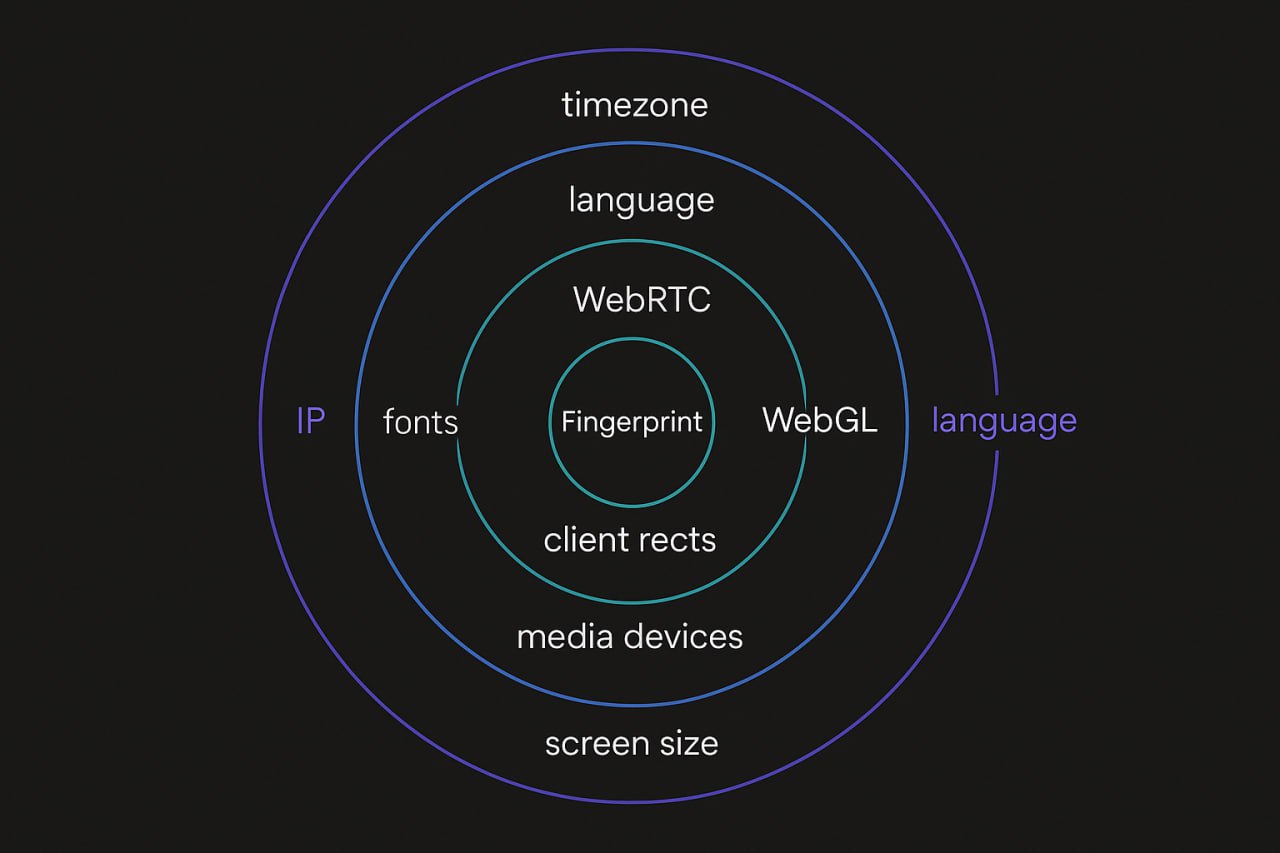
An anti-detect browser solves this problem by allowing alteration or emulation of any identifiable parameters. Dolphin Anty effectively “multiplies” your environment: for example, your actual PC with an Intel i7 processor located in Perm can masquerade as a different machine with an i5 processor supposedly located in Rome. Each profile in Dolphin is an isolated container with its own data, entirely separated from the others. In different tabs, you can simultaneously run, say, a U.S. Facebook account and a German Google account, with websites unable to tell they are open on the same device, since the fingerprints differ completely.
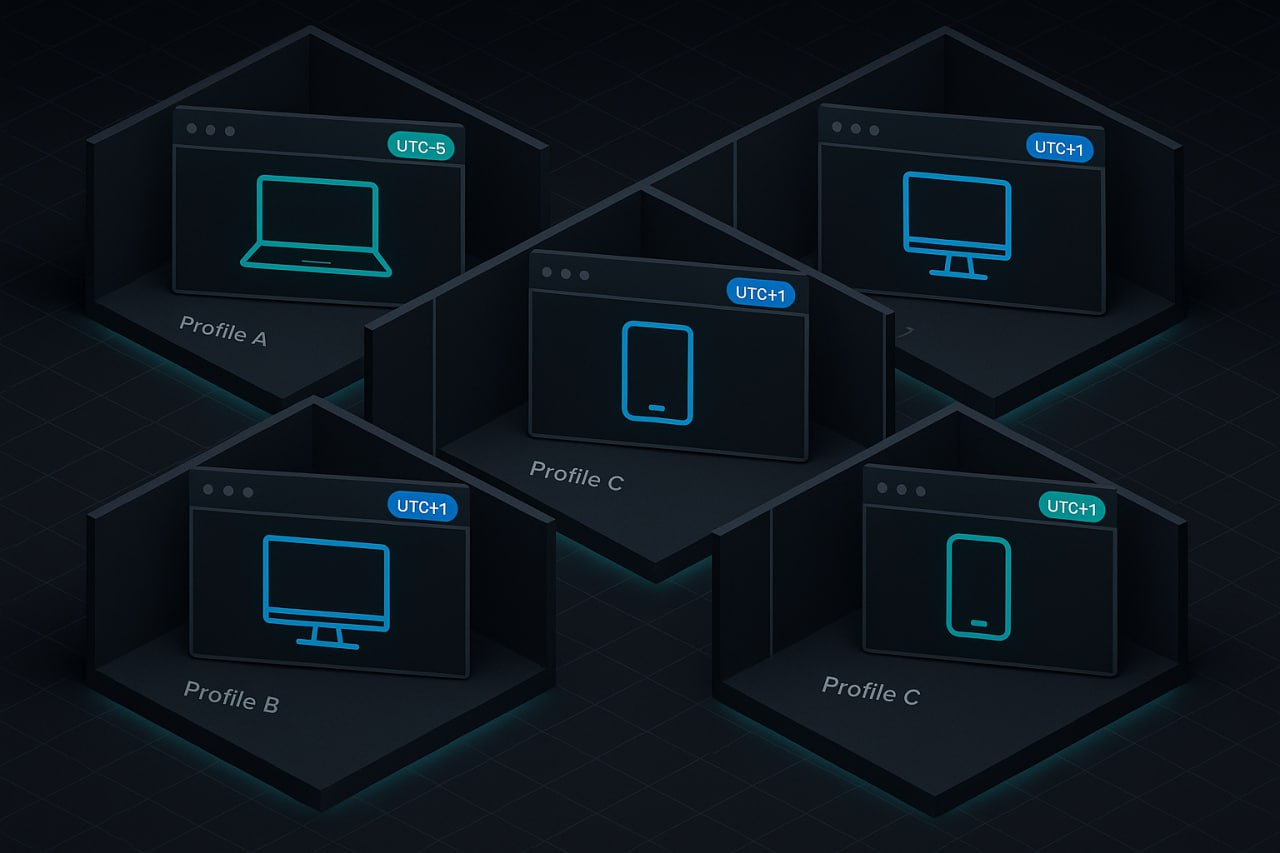
Dolphin Anty can spoof dozens of environment parameters. Among them are the key attributes read by websites: WebRTC, Canvas, WebGL, Client Rects, audio configuration, time zone, system language, geolocation, CPU and memory characteristics, screen size, list of media devices, open ports, and more. Moreover, Dolphin’s developers collect real user fingerprints and generate configurations for clients based on them. This ensures that every new profile’s parameters look plausible and avoid impossible combinations. All data (cookies, cache, local storage) is strictly isolated by profile-no stray trace can link your accounts together.
It is important to emphasize that IP address substitution lies outside the browser’s scope-this requires proxy servers or a VPN. Anti-detect browsers do not change IPs by themselves, but Dolphin Anty includes a convenient built-in toolkit for working with proxies. Properly selected proxies (residential proxy or mobile) for each profile are just as critical as fingerprint spoofing, since IP often serves as the primary session identifier.
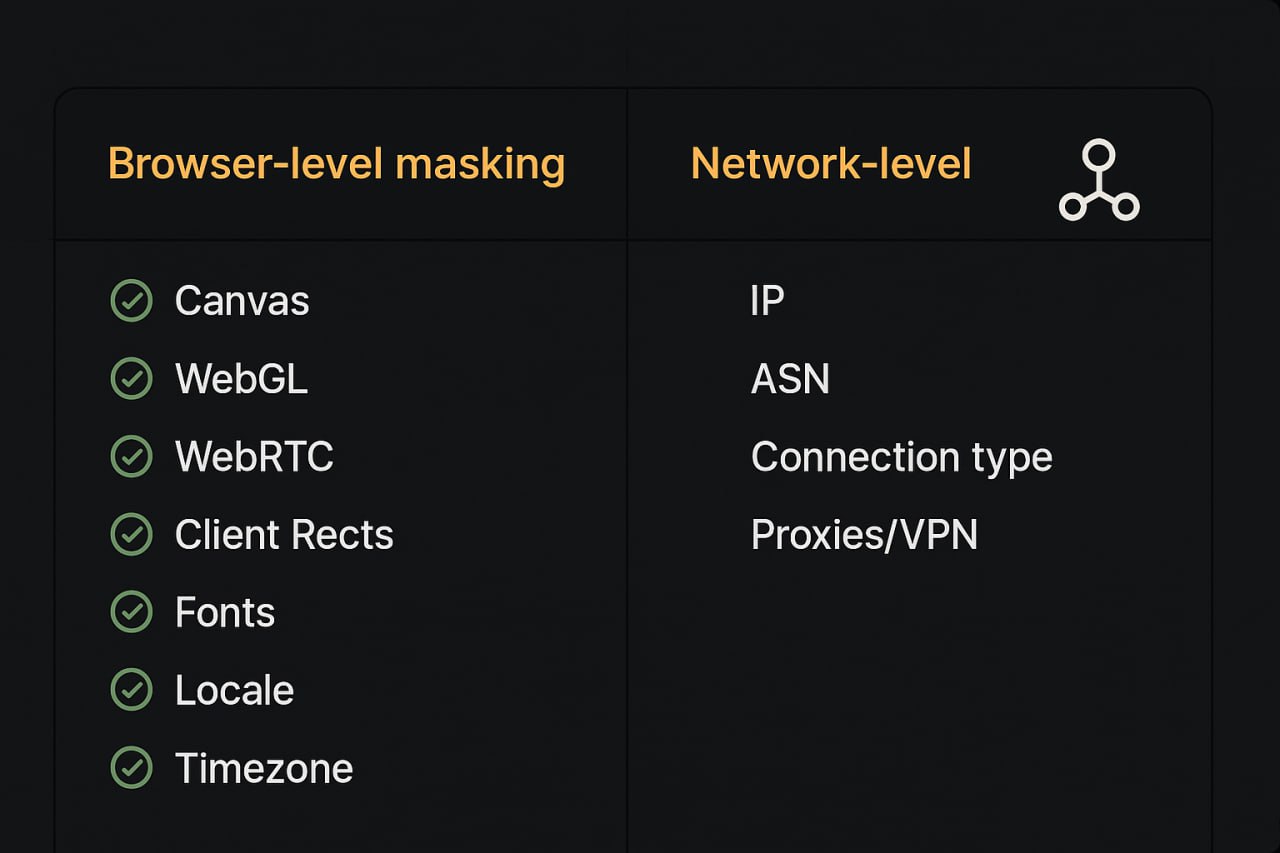
In practice, Dolphin Anty’s quality of masking is confirmed through checks with specialized services. Profiles created in Dolphin successfully pass fingerprint scanner tests such as Pixelscan and CreepJS without showing obvious signs of spoofing. Nevertheless, one must understand that no anti-detect browser can provide an absolute guarantee of indistinguishability from a regular user. Minor inconsistencies may remain-for example, a nonstandard font list or anomalies in the User-Agent could betray emulation. Dolphin’s developers openly acknowledge these limitations and recommend testing profiles yourself through tools like Whoer.net or Pixelscan. At the same time, the higher the quality of the anti-detect browser, the more parameters it correctly substitutes, so even with minor discrepancies, anti-fraud systems may simply decide they are dealing with an ordinary privacy-conscious user. Dolphin Anty continuously updates the Chromium core and its spoofing methods to address newly discovered “leaks” of identifiers.
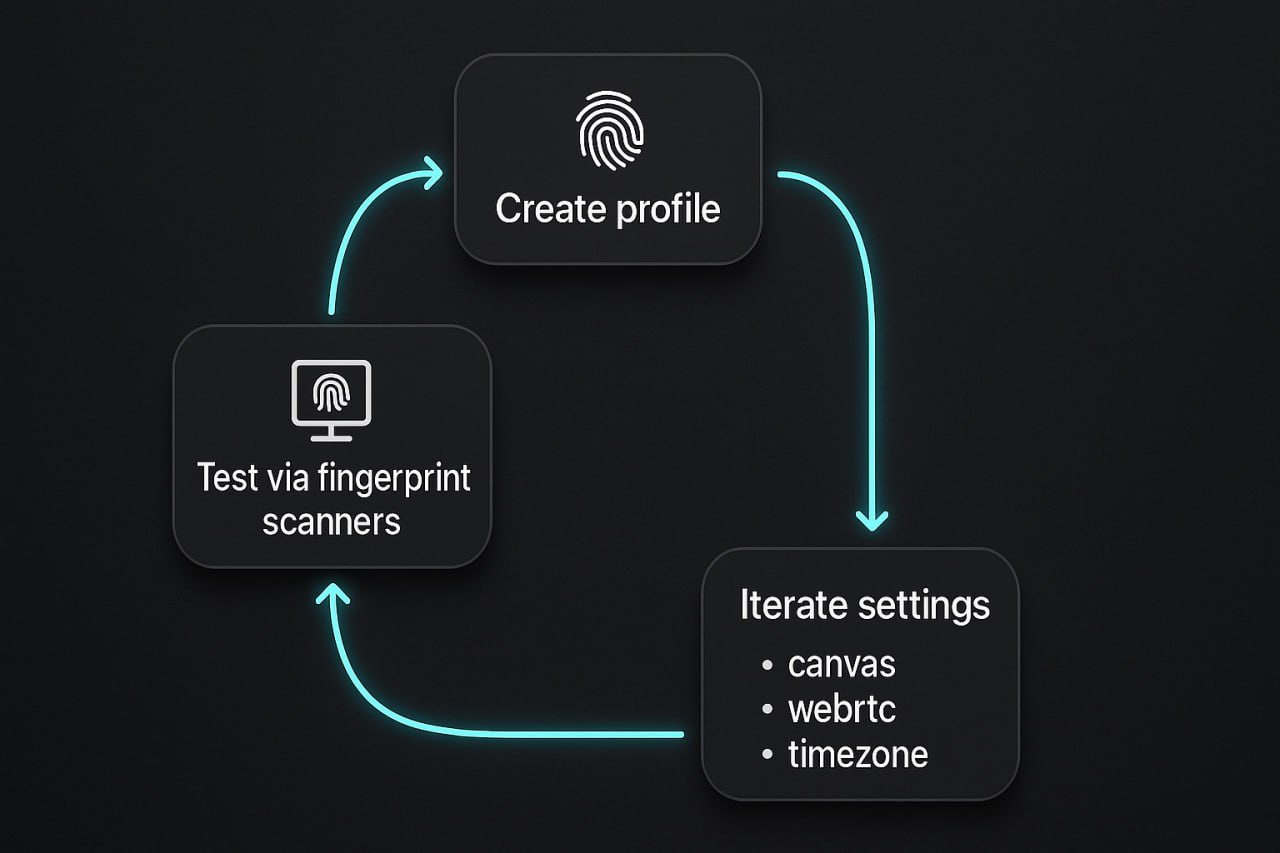
Core Features of Dolphin Anty
Dolphin Anty provides a wide range of features for convenient and secure management of multiple accounts. Below are its key capabilities important for practical use of an anti-detect browser.
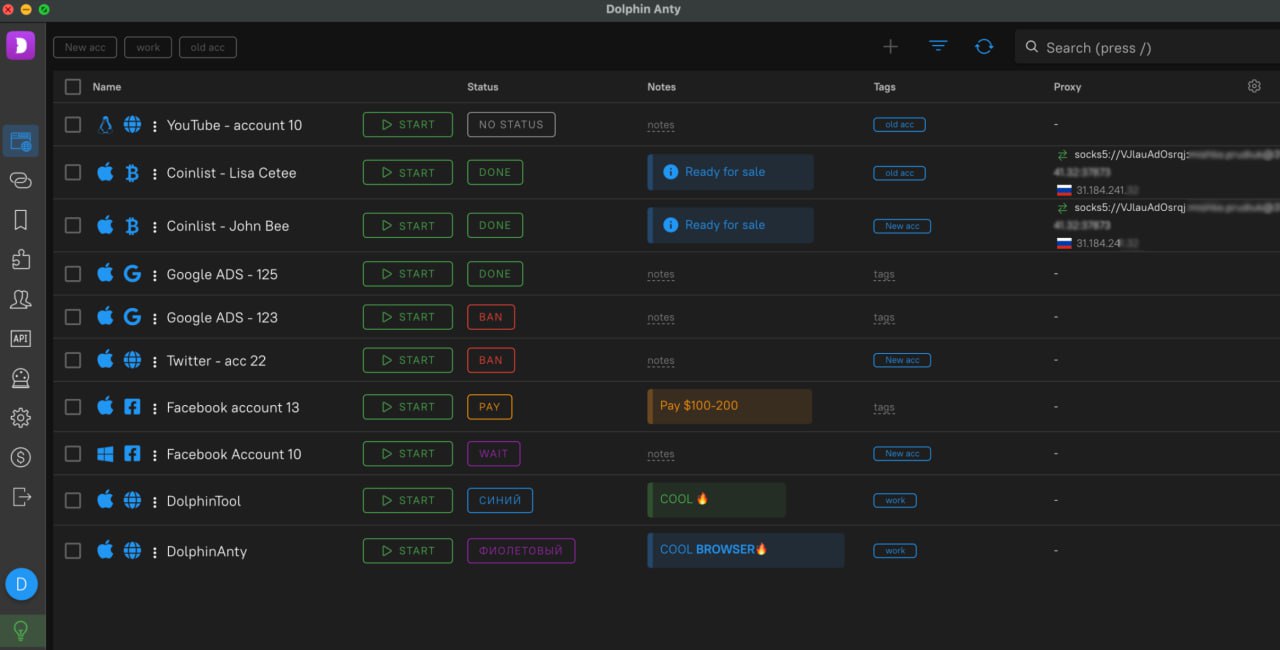
-
Profile isolation. Each profile is stored separately, with its own status and notes, making it easy to manage dozens or even hundreds of accounts simultaneously.
-
Unlimited profiles. From a single device, you can launch as many browser profiles as you need-effectively removing any limit on parallel account operations. Each profile has a unique fingerprint and its own data storage (cookies, cache, etc.), with no parameter “leaking” between profiles. Even the free base plan allows up to 10 profiles, while paid plans scale this up to hundreds or thousands as needed. This makes virtually any multi-accounting scenario possible within one application.
-
Organization and metadata. For user convenience, Dolphin Anty lets you assign each profile a name, arbitrary tags, a status (e.g., “New,” “Ready,” “Blocked”), and even a color label or icon. Statuses help teams immediately see what’s happening with an account (for example, new, prepared for use, or banned). Text notes can also be attached to profiles to record important information (linked emails, registration dates, budgets, etc.). A flexible filtering and search system (by tags, statuses, proxies, user, primary activity domain, and more) allows quick retrieval of the right account even in large volumes.
-
Team collaboration. Dolphin Anty was originally built with team use in mind, particularly for traffic arbitrage, so it includes a robust multi-user system. An administrator can invite others and assign them roles with specific permissions, such as Administrator, Team Lead, Buyer, or Farmer. Depending on the role, access to actions is limited: some users may only launch profiles and run scripts, while others can add new team members or change profile settings. Profiles can also be transferred between users-a ready-made profile can be handed over to a colleague without sending files or manually replicating settings.
-
Proxy Manager. Proxies are an essential part of anti-detect browser usage, and Dolphin Anty offers an integrated Proxy Manager for handling them. In a dedicated interface section, you can add proxies of different types (HTTP/SOCKS5), specify authentication details, bulk edit them, or check their availability. Each proxy is then assigned to a specific browser profile (each account has its own exit IP). For mobile proxies, a convenient feature allows IP rotation on demand: a single click in the Dolphin interface refreshes the allocated IP (via the provider’s API URL). This is particularly useful when regularly obtaining a “fresh” mobile IP without changing the proxy itself.
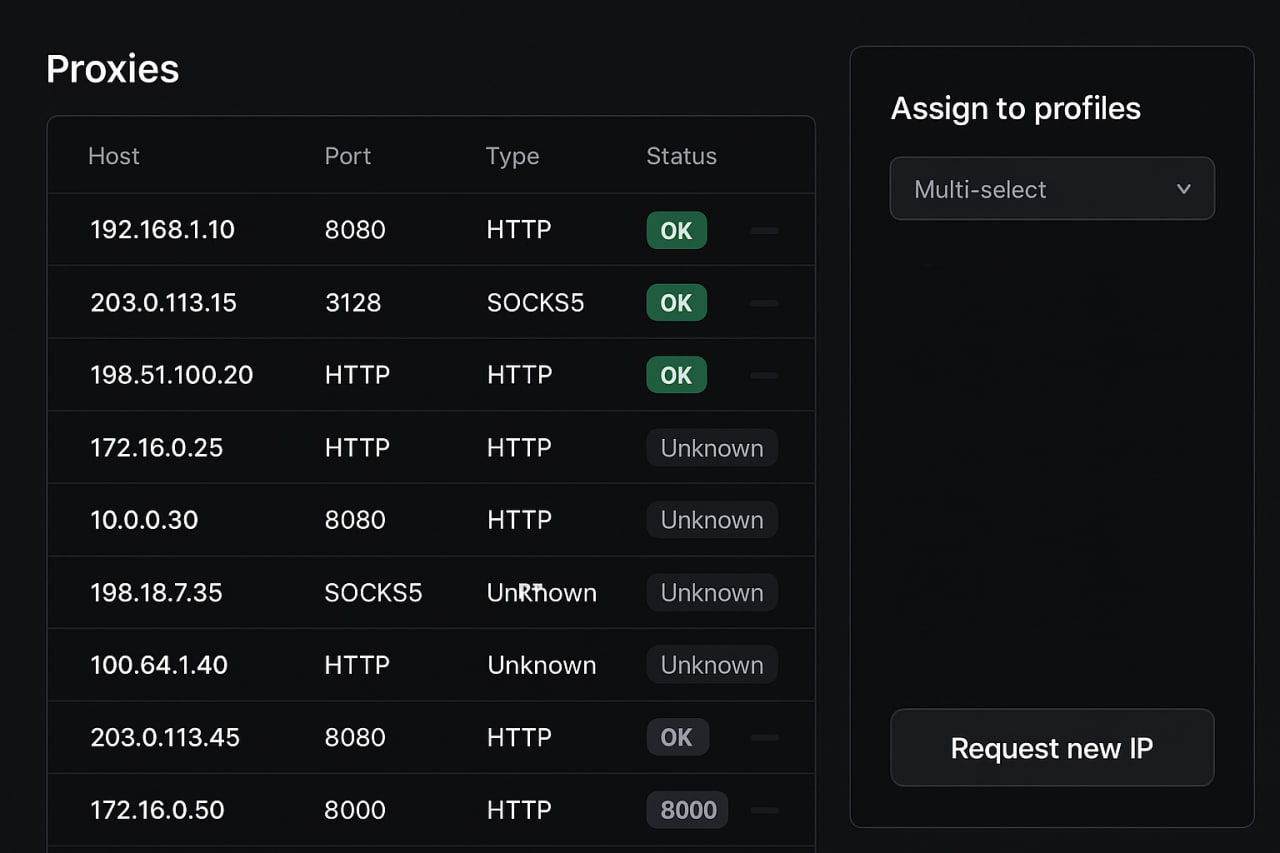
-
Extensions and bookmarks management. Dolphin Anty allows installation of browser extensions just like in Google Chrome-via the Chrome Web Store or by uploading a custom .zip archive. Extensions can be bound to selected profiles or disabled when not needed. Similarly, the browser supports creation of shared bookmarks-add a URL once (with a name), and it will be accessible in all profiles. This simplifies work when dozens of accounts need access to the same resources (landing pages, trackers, mail services, etc.). Bookmarks and extensions are synchronized across devices along with profiles.
-
Bookmark folders. A recently introduced feature lets users group bookmarks into folders and apply them en masse to selected profiles. Previously, bookmarks had to be added manually to each profile, which became a tedious and time-consuming task with large account sets. Now you only need to create a folder with the required sites once and link it to the target group of profiles. The bookmarks from that folder automatically appear in all chosen browsers, with the option to edit, delete, or exclude individual links for specific profiles. This approach streamlines environment synchronization and saves considerable time when managing accounts at scale.
-
Automation. Built-in tools in Dolphin Anty enable automation of routine operations without programming skills. With the script builder (“Scenarios”), you can record and replay action sequences such as logging into an account, filling in a profile, or scraping data from a page. Templates can be created manually or drawn from the community. In addition, Dolphin Anty supports profile control via external code, with integration for Selenium, Puppeteer, Playwright, and other popular web automation frameworks. This opens opportunities for developers to programmatically launch profiles, fetch site data (e.g., from Cloudflare-protected domains), and perform bulk operations (account registrations, post publishing, etc.) with minimal human input.
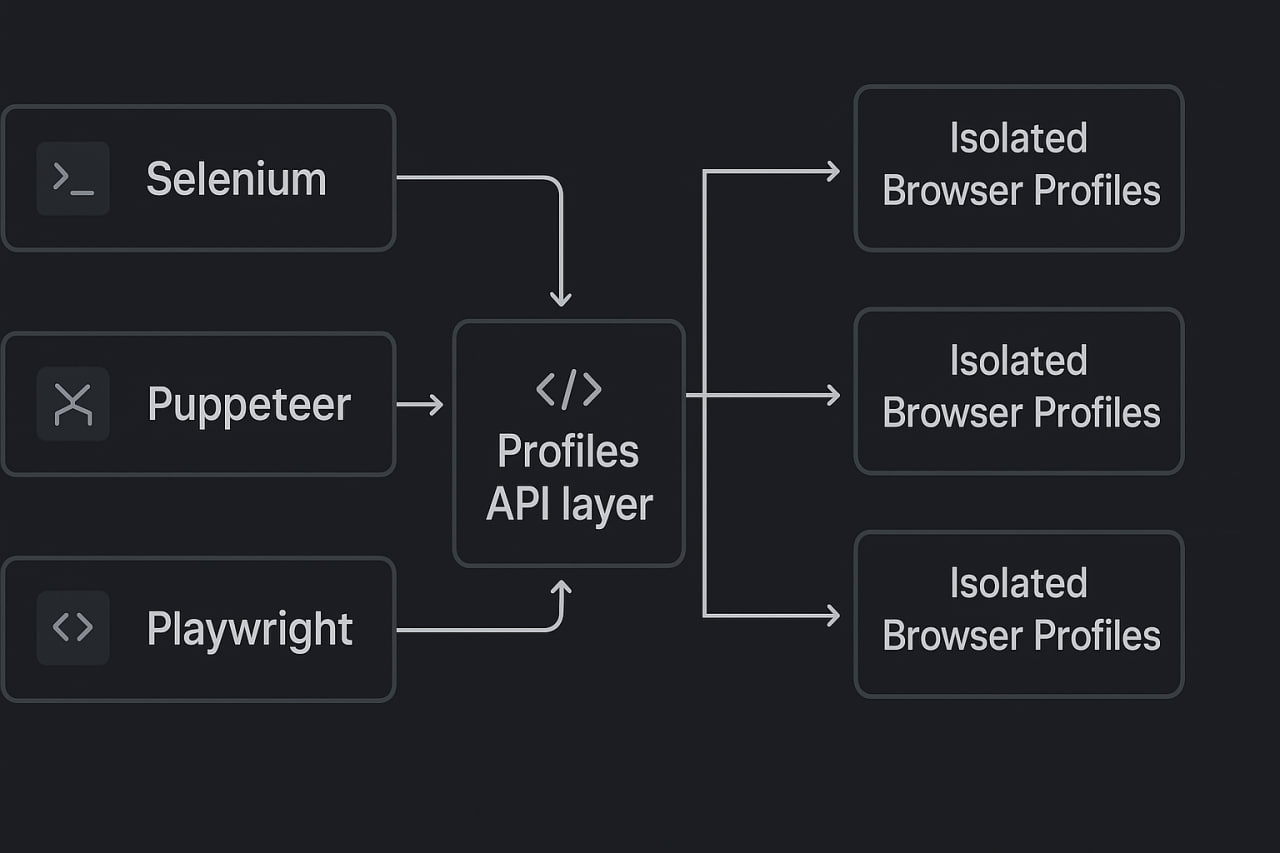
- Synchronization and bulk operations. A unique Dolphin Anty function is the action synchronizer, which lets you manage groups of profiles in parallel. For example, you can add the same extension to all selected profiles or update a setting (language, time zone, etc.) across multiple browsers simultaneously. Bulk import and export of profiles is supported: you can load hundreds of accounts from a CSV/Excel template or export existing profiles (including cookies) for backup or transfer. Bulk cookie export per selected profiles is also available-useful for analytics or session migration.
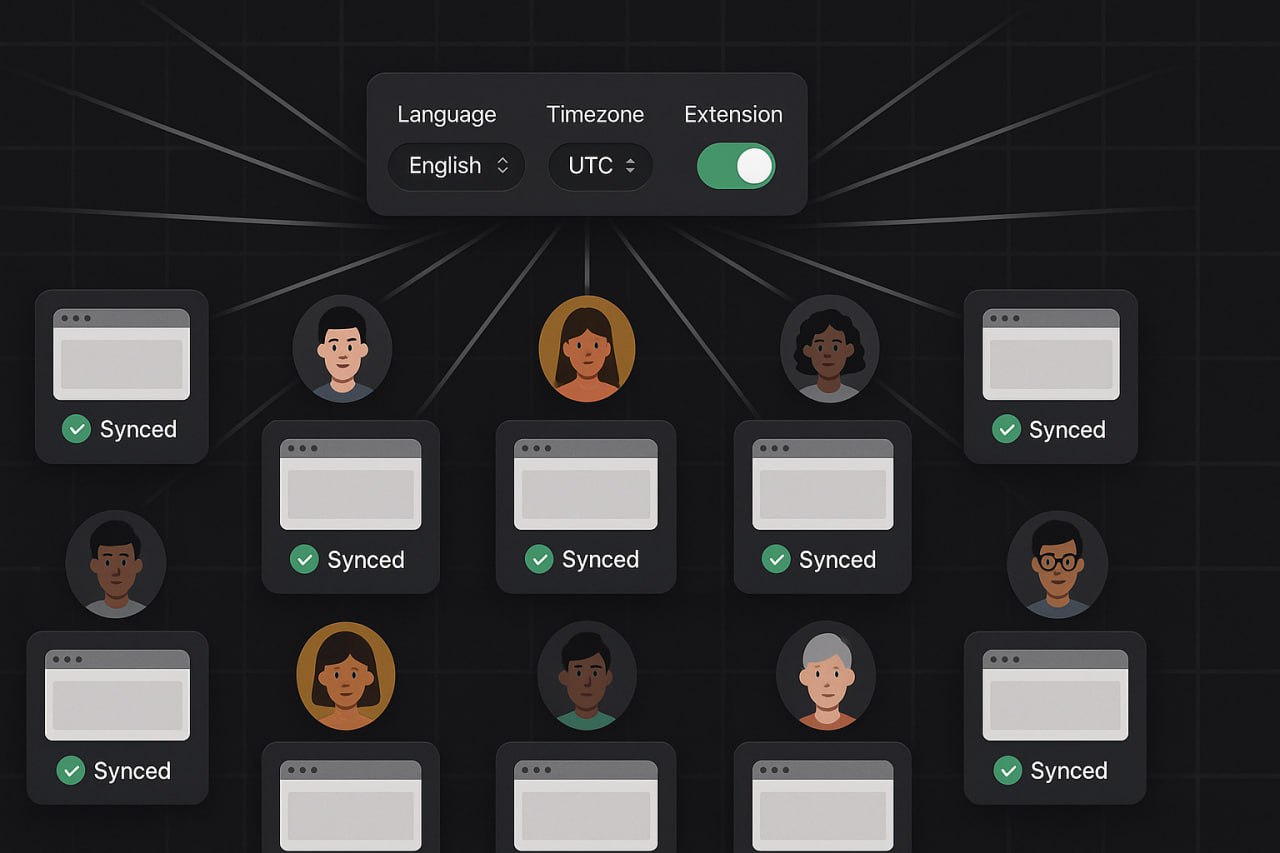
-** Cookie Robot and account warming**. Dolphin Anty includes a built-in Cookie Robot that automatically generates browsing activity for a new profile. The robot can visit popular sites, collect cookies, and thus create the appearance of a real “warmed up” user. This saves time otherwise spent manually preparing each new account. Generated cookie files can be stored and reused later, ensuring a new account already has a browsing history on first real use-reducing the risk of rapid bans (especially on Facebook/Google Ads). Dolphin also allows import of pre-prepared cookie files (e.g., from another browser) into a profile and export of current cookies at any time.

-
Profile cloning and recovery. A useful feature for experimentation is profile duplication with randomized fingerprints. With one click, Dolphin can create a copy of a chosen profile but with new unique fingerprints. Core account data (cookies, bookmarks, etc.) can be preserved while identification parameters change. This is handy for running multiple similar accounts on a service with minimal variation or for testing site behavior under different browser configurations. Dolphin Anty also implements a “Recycle Bin” for deleted profiles-any profile can be restored within 48 hours of deletion. This safeguard against accidental deletion is especially valuable when working with large account volumes.
-
Interface and support. Dolphin Anty’s interface is intuitive: light or dark themes, Russian and English translations, and a convenient layout of controls. The program is stable and lightweight-performance remains high even with many profiles running simultaneously. Developers pay attention to detail and regularly update functionality in response to community feedback. Technical support is available directly through the browser interface or via the website, ensuring prompt resolution of issues. All Dolphin Anty plans include the full feature set (proxy manager, extensions management, team access, etc.) with no artificial restrictions-differences lie only in profile and team member limits.
Use Cases for Dolphin Anty
Anti-detect browsers are in demand across many areas where multiple identities or circumvention of restrictions are required, including:
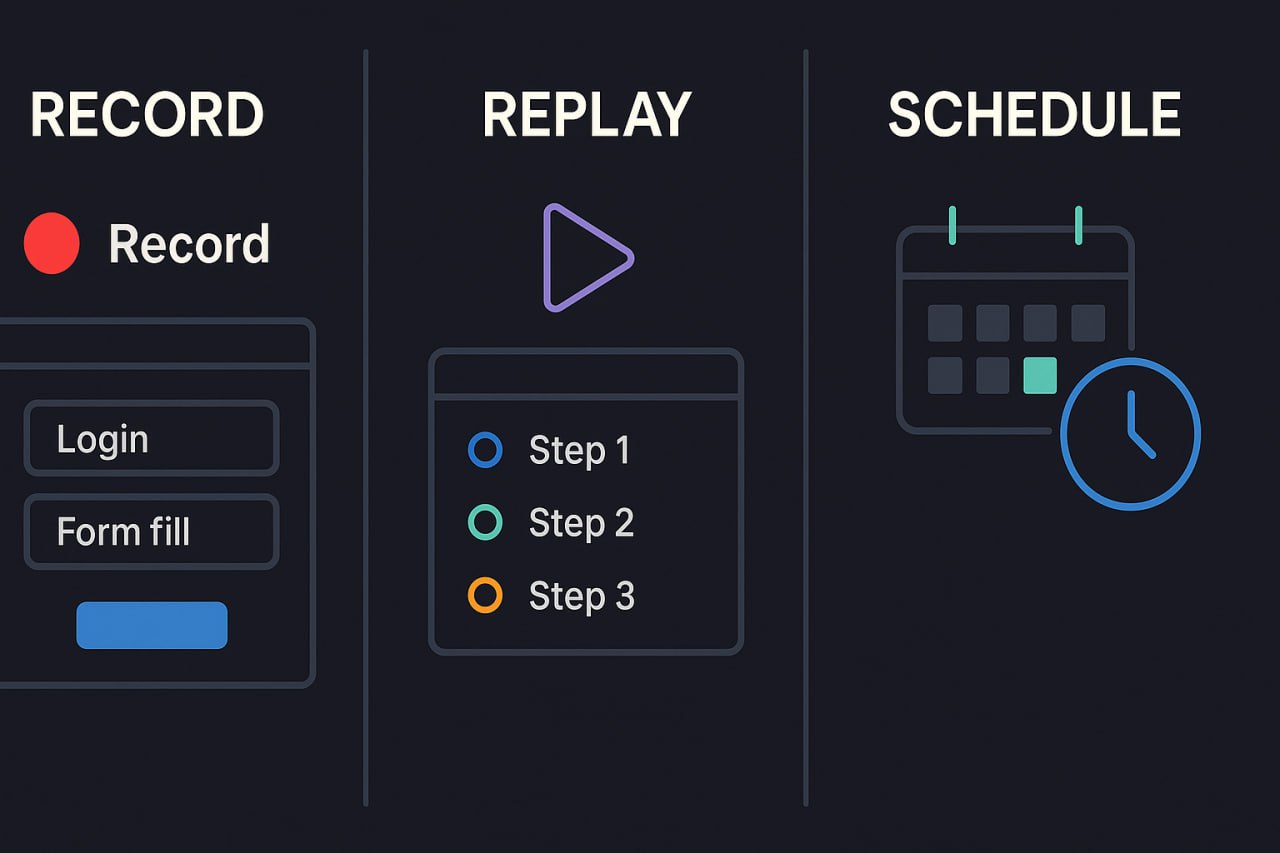
-
Traffic arbitrage and ad networks. The classic case: launching numerous ad accounts for affiliate marketing. Arbitrage teams create dozens of profiles under different offer/GEO/platform combinations (Facebook Ads, Google Ads, etc.), isolating them through Dolphin Anty. This enables scaling campaigns without mass bans, as each account appears to be an independent real user. Automation further boosts efficiency by handling ad launches, creatives, and other repetitive tasks.
-
Social media and SMM. Marketers value anti-detect browsers for safely managing multiple accounts on a single platform-for example, operating dozens of Instagram or TikTok accounts for advertising, community management, or customer support. Dolphin Anty helps prevent multi-account bans: each profile window has unique device parameters and its own proxy, so the platform cannot detect common ownership. At the same time, all accounts are conveniently managed in one interface.
-
Cryptocurrency and fintech. In crypto trading and DeFi, users often need multiple exchange accounts-for bypassing trading limits, price arbitrage, or joining IDOs/airdrops from different wallets. Using a single browser is risky-exchanges can quickly link accounts via fingerprints and IPs. With Dolphin Anty, traders can log into the same exchange under different accounts, emulating various devices from around the world. The same applies to other financial services (payment systems, online banking), where anonymity and independent profiles are crucial for testing or exploitation.
-
Online gambling and betting. Bookmakers and casinos usually restrict accounts and bonuses per person. However, betting arbitrageurs and professional players often create multiple accounts to bypass stake limits or claim welcome bonuses repeatedly. Dolphin Anty allows simultaneous operation of dozens of gaming profiles, each with its own persona (unique fingerprint, country-specific IP, separate cookies). This reduces multi-account ban risks and enables comparison of odds across accounts or simultaneous transactions. Of course, many platforms require identity verification, but during registration and early play, an anti-detect browser greatly extends account longevity.
-
E-commerce and marketplaces. Sellers on marketplaces and online stores use multiple accounts to boost product rankings, monitor competitors, or bypass platform restrictions. On Amazon or Wildberries, for example, multiple seller accounts belonging to one owner can provide a competitive edge. Dolphin Anty lets entrepreneurs manage many stores under different profiles, with each storefront isolated (otherwise, platforms could detect overlaps by IP/browser and block accounts). This is also valuable for marketplace scraping-price and product data can be collected from multiple profiles in parallel without triggering anti-bot defenses.
-
Web service testing and development. Developer and security research teams also benefit from anti-detect browsers. Dolphin Anty makes it possible to emulate various user environments for QA testing: checking site behavior for visitors from different countries, devices, browsers, and security settings. Bugs tied to specific languages or time zones can be identified, and anti-fraud mechanisms tested. The tool is also valuable for studying tracking and data protection methods-researchers can directly observe which fingerprints sites gather and experiment with spoofing them. Naturally, Dolphin is also used in web scraping: combined with Selenium/Puppeteer, it helps bypass Cloudflare and other anti-bot protections during mass data collection. Any project requiring flexible browser environment configuration gains an advantage from using an anti-detect solution.
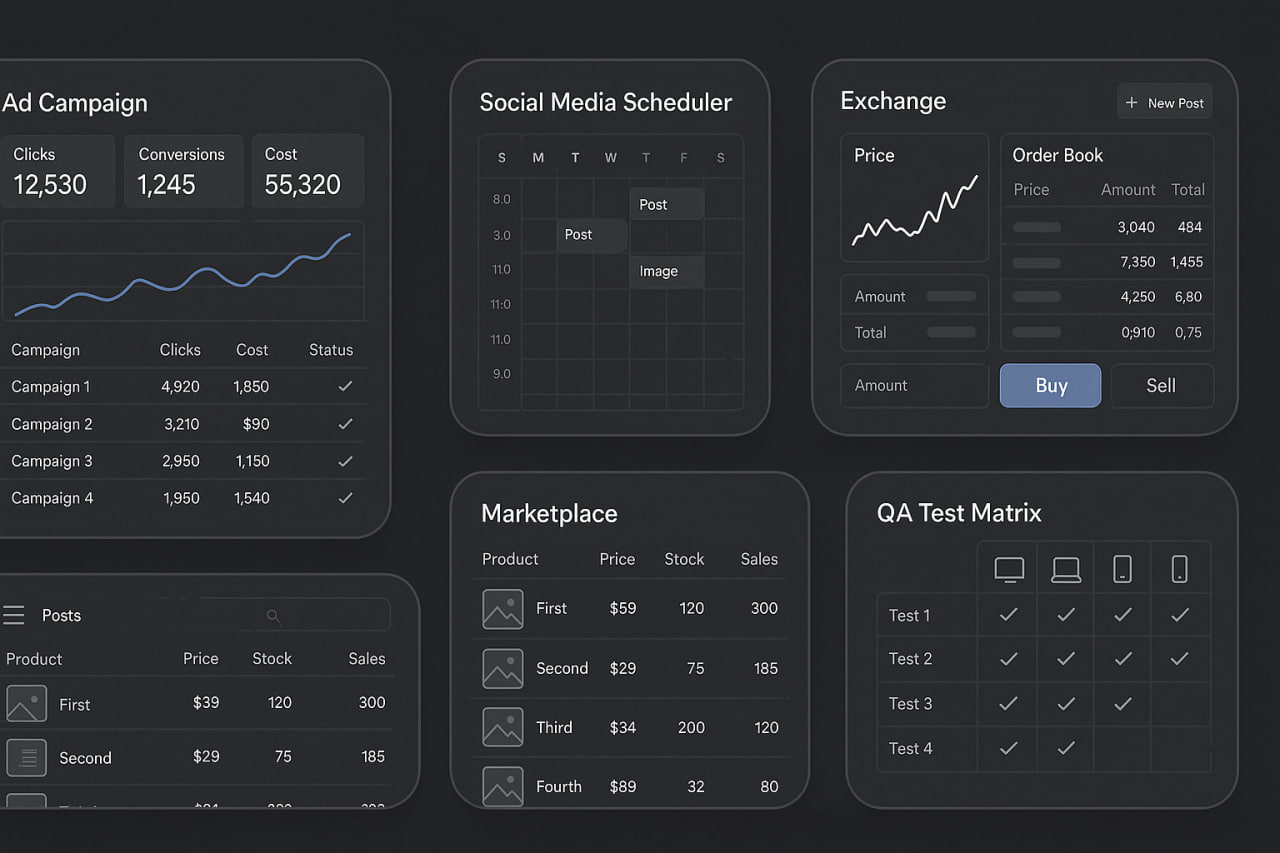
Conclusion
Today, Dolphin Anty stands as one of the most powerful and versatile solutions for multi-accounting and online identity masking. Thanks to its custom Chromium-based engine, it delivers high-quality data obfuscation.
Despite its professional-grade functionality, Dolphin Anty remains highly accessible. Like most top anti-detect browsers, it is subscription-based, but it offers a free plan with up to 10 profiles and no time limit. This is sufficient to explore the full feature set and even run small projects. As needs grow, you can upgrade to paid plans supporting hundreds or thousands of profiles.
In summary, Dolphin Anty is no longer just a niche tool for traffic arbitrage but a universal platform for anyone who values anonymity, multi-accounting, and security in today’s web environment.